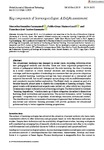Mostrar o rexistro simple do ítem
Key components of learning ecologies : a Delphi assessment
| dc.contributor.author | González-Sanmamed, Mercedes | |
| dc.contributor.author | Muñoz-Carril, Pablo-César | |
| dc.contributor.author | Santos Caamaño, Francisco J. | |
| dc.date.accessioned | 2024-01-29T18:30:14Z | |
| dc.date.issued | 2019-05-15 | |
| dc.identifier.citation | González-Sanmamed, M., Muñoz-Carril, P.-C. and Santos-Caamaño, F.-J. (2019), Key components of learning ecologies: A Delphi assessment. Br J Educ Technol, 50: 1639-1655. https://doi.org/10.1111/bjet.12805 | es_ES |
| dc.identifier.issn | 0007-1013 | |
| dc.identifier.uri | http://hdl.handle.net/2183/35208 | |
| dc.description.abstract | [Abstract] The educational landscape has changed in recent years, requiring reflection about new pedagogical methods and theories. There are three important perspectives as drivers of pedagogical reflection: lifelong and life-wide learning, the idea of learning as a social construct in which internal elements and changing external factors converge, and the recognition of technology as a resource that can promote ubiquitous and expanded learning. Learning ecology has been proposed as a conceptual and empirical framework, but its still emergent nature along with its multidimensionality and complexity require further exploration. The Delphi study we present as part of a broader research project aims to identify the components of learning ecologies. Three panel rounds with international experts were carried out, after which two important dimensions emerged in the structure of learning ecologies. The first is related to intrinsic “learning dispositions,” which is made up of three categories: the subject's ideas about learning, their motivations and expectations. The second dimension, called “learning processes,” comprises four components: relationships, resources, actions and context. The identification of the components of learning ecologies and their influence on formal, non-formal and informal training processes will provide guidance for educational policies and help to better organize training programmes. | es_ES |
| dc.description.sponsorship | We thank the Spanish Ministry of Economy and Competitiveness for their support of our study under a research project entitled “How the best University Teachers Learn: Impact on Learning Ecologies on Quality of Teaching” (ECO4LEARN-HE) (Reference: EDU2015-67907-R). | es_ES |
| dc.description.sponsorship | Ministerio de Economía y Competitividad; EDU2015-67907-R | es_ES |
| dc.language.iso | eng | es_ES |
| dc.publisher | British Educational Research Association (BERA) | es_ES |
| dc.relation.uri | https://doi.org/10.1111/bjet.12805 | es_ES |
| dc.rights | © 2019 British Educational Research Association | es_ES |
| dc.subject | Learning ecologies | es_ES |
| dc.subject | Delphi method | es_ES |
| dc.title | Key components of learning ecologies : a Delphi assessment | es_ES |
| dc.type | info:eu-repo/semantics/article | es_ES |
| dc.rights.access | info:eu-repo/semantics/embargoedAccess | es_ES |
| dc.date.embargoEndDate | 9999-99-99 | es_ES |
| dc.date.embargoLift | 10007-06-07 | |
| UDC.journalTitle | British Journal of Educational Technology | es_ES |
| UDC.volume | 50 | es_ES |
| UDC.issue | 4 | es_ES |
| UDC.startPage | 1639 | es_ES |
| UDC.endPage | 1655 | es_ES |
Ficheiros no ítem
Este ítem aparece na(s) seguinte(s) colección(s)
-
GI-EIRA - Artigos [30]






